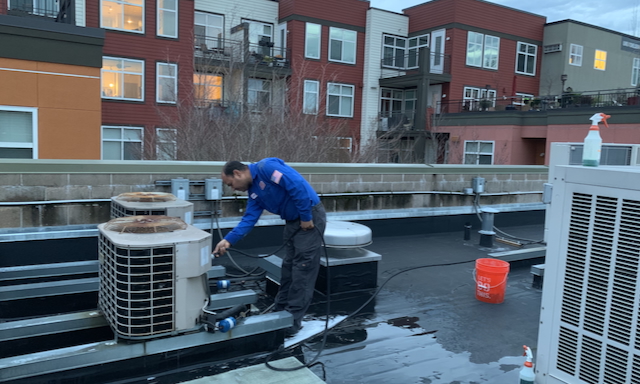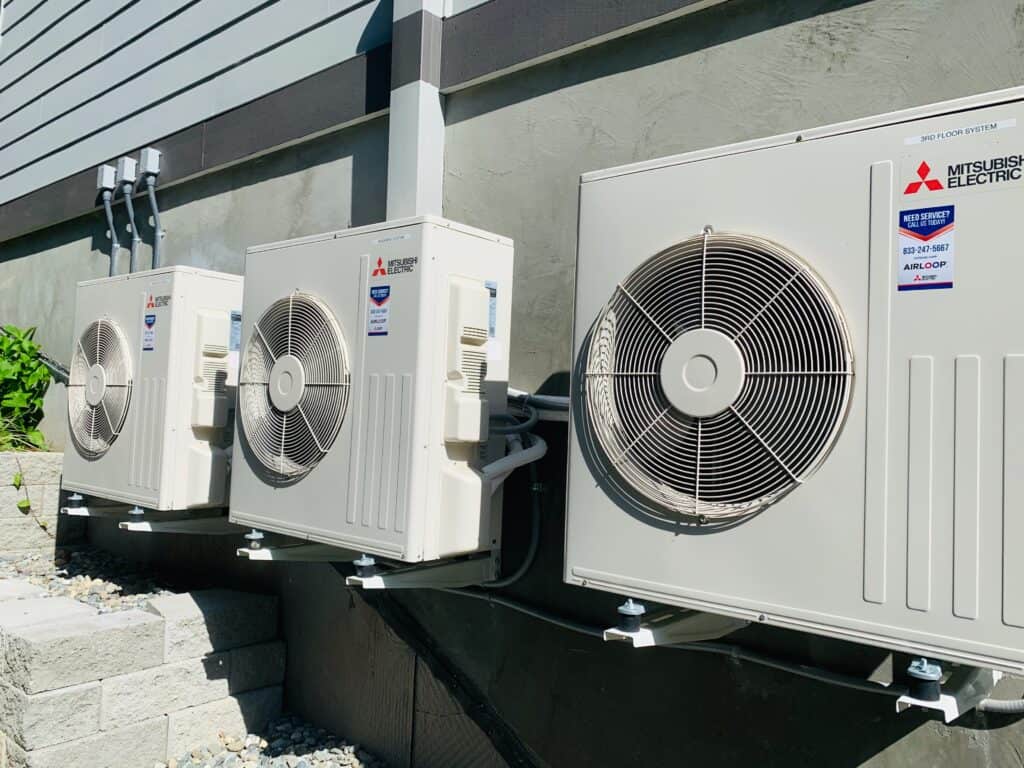Residential Heating Specialists • Bothell & Eastside WA
Seattle's Expert Furnace & Heat Pump Repair and Installation
Trusted AC, Furnace, and Heat Pump Experts for Residential Homes, Commercial Businesses, and Property Managers across the 40-mile Seattle Metro Area.
- Transparent Pricing.
- Fast Local Response.
- Fully Licensed & Insured.
- Residential, Commercial, & Property Management.
HVAC Services for Homes & Businesses
Heating System Repair
Expert diagnostics and repair for gas furnaces, electric furnaces, and heat pumps. We solve issues fast across Bothell, Woodinville, and Redmond.
New System Installation
High-efficiency furnace and heat pump replacement, installation of boilers, and customized mini-split systems. We handle full system upgrades and replacements.
Preventative Maintenance
Annual furnace and heat pump tune-ups and safety checks that extend equipment lifespan, reduce energy bills, and maintain manufacturer warranties.
Expert Furnace Repair & Replacement in King County
Furnaces remain the workhorse of heating in the Northwest. We address common issues like ignition failures and noisy operation fast. If your system is over 15 years old, our high-efficiency **furnace replacement** services qualify for utility rebates, saving you money immediately.
- Gas & Electric Furnaces
- All Major Brands (Trane, Carrier, Lennox, etc.)
- Guaranteed Workmanship & Safety Checks


The Future of Heating: High-Efficiency Heat Pump Installation
Heat pumps provide year-round comfort, offering both cooling in summer and efficient heating in winter. Our certified installers help you navigate **local rebates** (PSE, Seattle City Light) and specialize in ductless **mini-splits** and ducted heat pump systems.
- Year-Round Heating & Cooling
- Access State & Utility Rebates
- Mini-Split & Ducted System Experts
What Homeowners Are Saying
Why Choose AirLoop for Your Seattle Heating Needs?
Local & Fast Response
We are based in Bothell, not a nationwide franchise. This means we treat every customer like a neighbor and prioritize rapid response to keep your home warm.
Upfront, Guaranteed Price
No surprise bills or hidden fees. We provide a full quote before work begins, ensuring transparency and trust—especially crucial for expensive installations.
All Solutions Covered
From aging gas furnaces to modern mini-splits and commercial rooftop units, we have the specialized expertise to manage your entire heating portfolio.
Don't get left in the cold this winter.
Schedule your furnace tune-up or heat pump consultation now.
Frequently Asked Questions
What are the 4 types of heating systems?
The four main types of heating systems are:
Furnaces: Furnaces, often part of a central heating system, work by blowing heated air through ducts that deliver warm air to rooms throughout the house via air registers or grills. They typically use natural gas, propane, heating oil, or electricity for fuel.
Boilers: Boilers heat water, providing either hot water or steam for heating. Steam is distributed via pipes to steam radiators, while hot water can be distributed via baseboard radiators or radiant floor systems, or can heat air via a coil. Boilers can use a variety of fuels including natural gas, propane, oil, or electricity.
Heat Pumps: Heat pumps are a more energy-efficient alternative to furnaces and air conditioners for climates with moderate heating and cooling needs. They use electricity to move heat from a cool space to a warm one, making the cool space cooler and the warm space warmer. There are different types of heat pumps, including air-source and ground-source heat pumps.
Active Solar Heating: Active solar heating systems use solar energy to heat a fluid — either liquid or air — and then transfer the solar heat directly to the interior space or to a storage system for later use. If the solar system cannot provide adequate space heating, an auxiliary or backup system provides the additional heat. Solar heating systems are best suited for regions with significant sunshine and can be supplemented with conventional heating systems.
What is best heating system for home?
The best heating system for a home depends on various factors including climate, house size, energy efficiency, initial installation cost, and running costs. Here’s a breakdown of how different systems might suit different needs:
Furnaces (Forced Air Systems):
- Best for: Homes in colder climates.
- Advantages: Quick heat up of the home; can be used in conjunction with central air conditioning; filters air impurities.
- Disadvantages: Can distribute allergens throughout the house; requires ductwork.
Boilers (Hydronic Systems):
- Best for: Homes in areas with reliable access to natural gas or oil; also good for homes that need or prefer radiant heat.
- Advantages: Provides consistent, radiant heat that feels more comfortable to many people; can be more efficient than forced air systems.
- Disadvantages: Slower to heat up; doesn’t double as a cooling system; requires radiators or in-floor systems.
Heat Pumps (Air-Source and Ground-Source):
- Best for: Mild to moderate climates (for air-source); any climate for ground-source (geothermal) but more effective in areas with less extreme winter temperatures.
- Advantages: Very energy-efficient; provides both heating and cooling; environmentally friendly, especially geothermal systems.
- Disadvantages: Air-source heat pumps are less efficient in extreme cold; high initial installation cost for geothermal systems.
Active Solar Heating:
- Best for: Sunny regions and for those seeking a green, sustainable option.
- Advantages: Renewable energy source; can significantly reduce energy bills; low operating costs.
- Disadvantages: High initial cost; requires a backup system; effectiveness depends on sunlight availability.
Electric Space Heaters (For Supplemental Heating):
- Best for: Supplemental heating in specific rooms or small homes; temporary heating needs.
- Advantages: Inexpensive to purchase; no installation required; portable.
- Disadvantages: Not suitable as a primary heat source for larger homes; can be expensive to operate.
What is the most reliable heating system?
The reliability of a heating system is influenced by factors like its type, installation quality, maintenance, brand, and the specific demands of the environment where it’s used. Here’s an overview of the general reliability of common heating systems:
Furnaces:
- Reliability: Generally high, especially modern, high-efficiency models.
- Key Factors: Quality installation, regular maintenance, and choosing a reputable brand are crucial.
- Durability: Typically lasts 15-20 years with proper maintenance.
Boilers:
- Reliability: Very reliable, particularly if well-maintained.
- Key Factors: Requires proper installation and regular maintenance, including checking for leaks and ensuring the water pressure is correct.
- Durability: Can last 15-30 years, often outlasting furnaces.
Heat Pumps:
- Air-Source Heat Pumps:
- Reliability: Can be less reliable in extreme cold temperatures but generally reliable in moderate climates.
- Durability: Lasts about 10-15 years.
- Ground-Source (Geothermal) Heat Pumps:
- Reliability: Extremely reliable due to fewer moving parts and protection from outdoor elements.
- Durability: The indoor components last about 25 years, while the ground loop can last 50 years or more.
- Air-Source Heat Pumps:
Active Solar Heating:
- Reliability: Highly reliable, particularly in sunny climates.
- Key Factors: Depends on consistent sun exposure; requires a backup system for cloudy days and nighttime.
- Durability: Solar collectors can last 20 years or more, but other system components may need replacement sooner.
Electric Baseboard Heaters:
- Reliability: Generally reliable as they have fewer mechanical parts.
- Durability: Can last many years with minimal maintenance.
